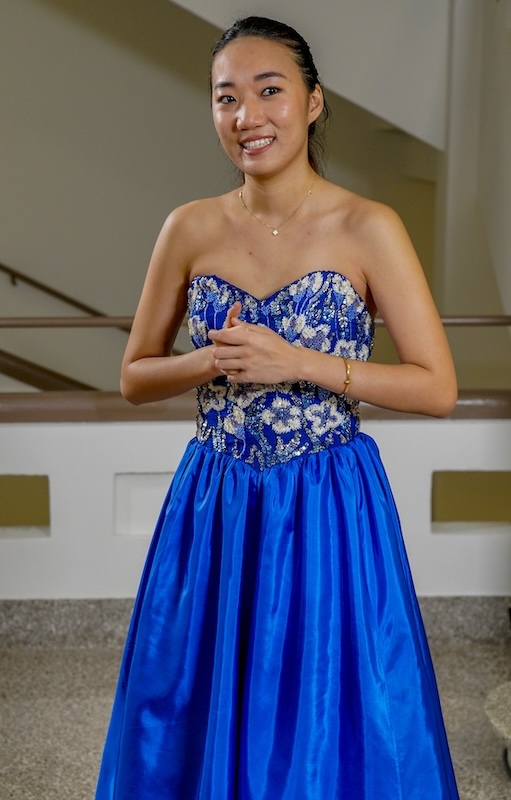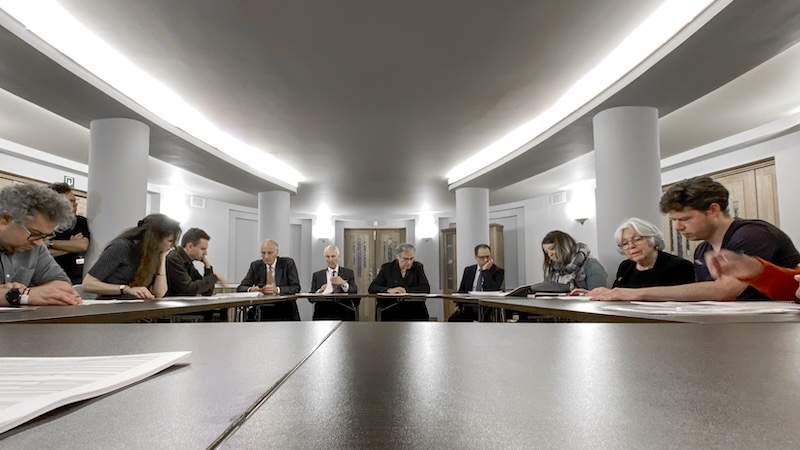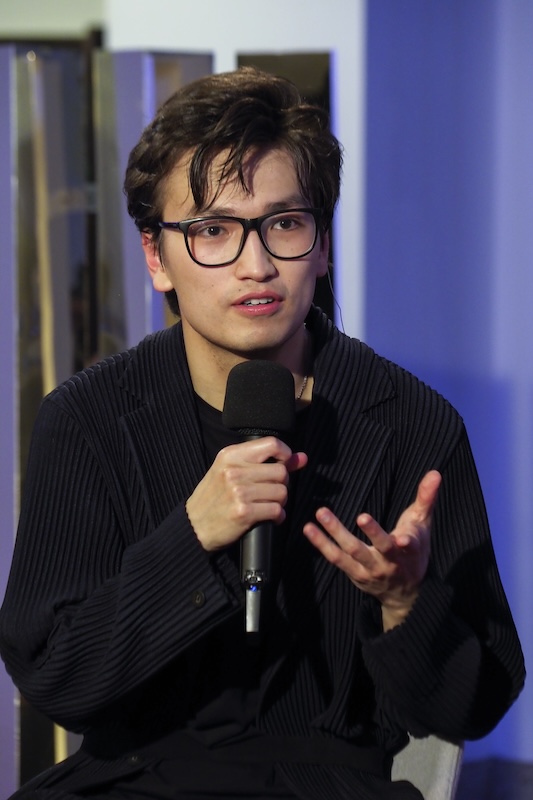We have thousands of human-written stories, discussions, interviews and reviews from today through the past 20+ years. Find them here:
Live from the Queen Elisabeth 2024: Atop the Pinnacle of Violin Competitions
BRUSSELS- An illustrious history adds to the mystique and magic of the Queen Elisabeth International Music Competition (QEIMC), which is currently in the midst of its 2024 Violin Edition Final Round, with 12 violinists performing this week - and awaiting the announcement of laureates on Saturday.
(Find videos and livestreams from the competition on this page. Here is the Youtube link.)
Queen Elisabeth of Belgium - along with her musical mentor, the eminent Belgian violinist Eugene Ysaÿe - initiated the competition in 1937, to foster interest in young gifted violinists and pianists. By 1988, a vocal competition was added, and in 2017 the cello competition was introduced.
A renowned jury, an adoring public, and a significant media buzz fueled by livestreams and live TV broadcasts from the massive Belgian Art Noveau Bozar hall are part and parcel to the success of the contest. It remains only major classical competition to be accorded decades of royal patronage, and a short survey of past winners - not to speak of jury members - inspires awe and wonder: David Oistrakh (first prize Ysaye Competition 1937); Philippe Hirshhorn (1967); Vadim Repin (1989); Nikolaj Znaider (1997); Ray Chen (2009), to name a few.
In past violin editions, the jury included the likes of Yehudi Menuhin, Ida Haendel, Zino Francescatti, Leonid Kogan, Isaac Stern, and Joseph Szigeti. This year, the jury for the Final Round includes world-renown artists and pedagogues of our current day: Augustin Dumay, Miriam Fried, Lorenzo Gatto, Philippe Graffin, Koichiro Harada, Dong-Suk Kang, Kyung Sun Lee, Midori, Vadim Repin, Vineta Sareika, Dmitry Sitkovetsky, Baiba Skride and Isabelle van Keulen.
The very configuration of the QEIMC sets it apart from an ever-burgeoning catalog of competitive music contests. With great credence given to contemporary music, the crowning glory at the QEIMC is given to the compulsory composition in the final round. Finalists have one week to master the piece and are kept in splendid isolation (no cellphones permitted) at the idyllic Chapelle Royale in the lush Belgian countryside.
Finalists past and present note that this week of intense study was an extraordinary life-changing experience. 2024 finalist Elli Choi shared that this year’s chosen 12 opted to band together to explore the compulsory piece, sharing ideas and even giving the work a run-through, with finalist Kevin Zhu conducting. Such musical camaraderie breathes a refreshing new life into the notion of "competition."

2024 QEIMC Finalist Elli Choi of the U.S. Photo by Ben Bonouvrier.
In an informative meet-the-composer session, journalists were gifted scores and inside information on this year's compulsory work: Thierry Escaich’s "Variations Litaniques," one of the finest to have reached the Bozar stage in recent violin competition history. Deriving inspiration from diverse sources ranging from Chopin ballads to jazz improvisation, the work is structured along the variations of a Gregorian antiphon. In less than 15 minutes, the listener is immersed in a dialogue between soloist and orchestra that superimposes jazz and atavistic beats onto a classical palette.

2024 QEIMC Meet the Composer Score Study. Photo by Ben Bonouvrier.
More than 60 candidates were selected in the pre-screening round to participate at this year’s competition. Although hopefuls came from around the world, half of the chosen 12 finalists hold the U.S. nationality (five of those with Asian backgrounds); two are Korean nationals; two are from Japan, one from Kazakhstan and one from the Ukraine. Although the competition’s upper age limit is set at 30, the majority of finalists are under the age of 25. From the perspective of the third day in the arena, it could be observed that several of the youngest could well have been advised to participate at the next edition of the competition to afford them the opportunity to mature artistically.
To bring that particular point home, a recent interview with Anne-Sophie Mutter penned by Ariane Todes in BBC Music Magazine (click here) underscores two of the master of dramatic expression’s greatest qualms related to today’s violin world. Mutter argues that with the passing of great old-school violin pedagogues, training even at the highest level is one-dimensional with no discernable differences between violin "schools." Her second concern centers on the present-day dearth of leading conductors who devote their energies to mentor young artists.
In order for any of the excellent laureates who reached the QE’s finals to enter the realm of sought-after soloists and/or make their mark in the chamber music world, they need to cast a wide net to gain different musical and even extra-musical perspectives. Her concerns beg the question: What is a desired career for young violinists, as social media changes our listening, not to speak of learning habits? Beyond the desire for many to conquer the concert stage, many other musical roads could and should beckon, in an era in which traditional solo careers are few and far between. Queen Elisabeth laureate 2009 Noah Bendix-Balgley’s career, with its extraordinary diversity (as First Concertmaster Berlin Philharmonic; member Rosamunde Quartet; with klezmer premieres and postings) is an example of a variegated, multi-faceted musical career.
In the QE Finals, Shostakovich First Violin Concerto led the way as a popular concerto choice, along with the commonly preferred Brahms and Tchaikovsky concertos. Surprisingly, the relatively long Elgar Concerto was chosen by two finalists, with the top pick of former years, the Sibelius Concerto chosen by only one of the twelve.
The first finalist, the 21-year-old Hana Chang’s diminutive appearance belies a laser focus and impassioned approach to performance. A musician of great character, her Tchaikovsky Violin Concerto favored speed over cantilena, rhythmic contrast over broad lyricism. Such an accomplished violinist of guts and grit may well have been advised to wait four years to enter the competition in order to develop a unique artistic personality.
The second performer on opening night, the Korean violinist Dayoon You’s rendition of the compulsory work was particularly memorable in its plausible storyline. He stole audience hearts with his exceptionally warm tone in an Elgar Concerto that culminated in the astonishing last movement accompanied cadenza.
The second night at Bozar brought two Brahms Concertos to the fore. Karen Su’s rendition was marred by small imperfections and a lack of synchrony with the orchestra while Ruslan Talas brought the orchestra to new heights of fine collaboration. A player of wondrous originality, his approach to "Variations Litaniques" was equally noteworthy.

Finalist Ruslan Talas of Kazakhstan. Photo by Ben Bonouvrier.
The only candidate to opt for the Sibelius Violin Concerto, Anna Im opened the second night. She performed with great delicacy, opting for an intimate range of sound. One would have wished for greater carrying power in the spacious Bozar.
The final candidate on the third night, Elli Choi wowed the audience with two spectacular performances. Her Strad soared through a creative rendition of the compulsory work that preceded a phenomenal, coloristic performance of Shostakovich’s First Violin Concerto. Choi’s ability to alternate between emotional rawness and transcendental soundscapes brought the audience to its feet.
In the magnificence of Brussels, Belgium’s capital, the QEIMC offers a feast for the eyes as well as the ears, with exhibits ranging from an insider’s guide to Eugene Ysaÿe’s instruments and life in letters augmented by public lectures on the master’s Guarneri del Gesu. Much beauty, variety and balm for the musical soul awaits as the last three nights of the competition beckon.
You might also like:
- Finalists Announced in the 2024 Queen Elisabeth Violin Competition
- 2024 Queen Elisabeth Violin Competition Names 24 Semi-Finalists
- Interview with Hilary Hahn: 100 Years of the Ysaÿe Sonatas
* * *
Enjoying Violinist.com? Click here to sign up for our free, bi-weekly email newsletter. And if you've already signed up, please invite your friends! Thank you.Tweet
Replies
Jean, how I envy you in the beautiful city of Brussels, the home of this marvellous competition. I have had trouble accessing the videos: perhaps RTVB.be are too anxious about my privacy, or maybe my failing laptop can't make the journey. Luckily, I have found links on YouTube.
Here is the Youtube link.
Thanks Laurie!
This article has been archived and is no longer accepting comments.














May 31, 2024 at 11:08 PM · Thank you, great to see coverage of this competition here on v.com. This competition is really in a class of its own. Every finals day is seen by the Brussels public as a fully fledged concert with a fully sold out concert hall. And even the first-round and semifinal sessions have hundreds of audience.